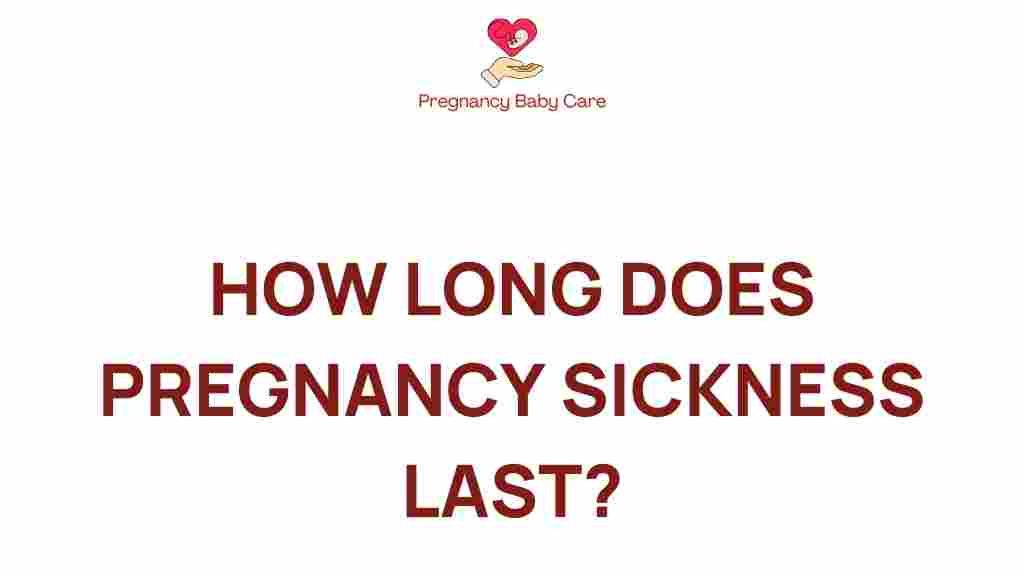Unraveling the Mystery: How Long Does Pregnancy Sickness Last?
Pregnancy is a remarkable journey filled with excitement, anticipation, and sometimes, unexpected challenges. One of the most common challenges that many expectant mothers face is pregnancy sickness, often referred to as morning sickness. This condition can manifest as nausea and vomiting, causing discomfort during the early stages of pregnancy. In this article, we will explore the duration of morning sickness, its symptoms, and provide helpful tips for managing this common ailment.
Understanding Pregnancy Sickness
Pregnancy sickness is a term used to describe the nausea and vomiting that many women experience during pregnancy. While it is commonly known as morning sickness, it can occur at any time of day or night. It generally begins around the sixth week of pregnancy and may last until the end of the first trimester. However, the duration can vary significantly among individuals.
Morning Sickness Duration
The morning sickness duration can be different for every expectant mother. Here are some key points to consider:
- First Trimester: Most women experience nausea during the first trimester, peaking between weeks 8 to 12.
- Duration Variation: While many women find relief by the end of the first trimester, some may continue to experience symptoms into their second trimester or even longer.
- Severe Cases: In rare cases, some women may develop hyperemesis gravidarum, a severe form of morning sickness that requires medical attention.
Symptoms of Pregnancy Sickness
Recognizing the symptoms of pregnancy sickness is crucial for expectant mothers. Common symptoms include:
- Nausea, particularly in the morning
- Vomiting
- Loss of appetite
- Fatigue
- Heightened sense of smell
These symptoms can vary in intensity and frequency, making it essential for expectant mothers to understand their bodies and seek support when needed.
Factors Influencing Morning Sickness Duration
Several factors can influence how long pregnancy sickness lasts, including:
- Hormonal Changes: The rapid increase in hormones, particularly human chorionic gonadotropin (hCG) and progesterone, can contribute to nausea.
- Multiple Pregnancies: Women carrying multiples (twins, triplets, etc.) often experience more severe symptoms and longer durations of morning sickness.
- Previous Experience: If a woman has experienced pregnancy sickness in a previous pregnancy, she may be more likely to experience it again, potentially with varying durations.
Tips for Managing Morning Sickness
While pregnancy sickness can be challenging, there are several strategies that expectant mothers can employ to alleviate their symptoms:
- Eat Small, Frequent Meals: Keeping your stomach from being empty can help reduce nausea. Try eating small, frequent meals throughout the day.
- Stay Hydrated: Drink plenty of fluids to stay hydrated, especially if you are vomiting.
- Ginger Products: Ginger tea, ginger ale, or ginger candies can be effective in reducing nausea.
- Avoid Triggers: Identify and avoid foods or smells that trigger your nausea.
- Rest and Relax: Stress can exacerbate nausea, so try to incorporate relaxation techniques like deep breathing or gentle yoga.
When to Seek Help
While pregnancy sickness is common, it’s important to know when to seek medical attention. You should contact your healthcare provider if:
- You are unable to keep any food or fluids down.
- You experience significant weight loss.
- You notice signs of dehydration, such as dark urine or dizziness.
- Your symptoms are severe and affecting your daily life.
In these cases, your healthcare provider may recommend treatments or medications to help manage your symptoms effectively.
Emotional Impact of Pregnancy Sickness
It’s essential to recognize that pregnancy sickness can also have an emotional impact on expectant mothers. The discomfort and unpredictability of nausea can lead to feelings of frustration, anxiety, and even isolation. Here are some ways to cope with the emotional toll:
- Connect with Others: Talk to other expectant mothers or join support groups to share experiences and advice.
- Seek Professional Help: If feelings of anxiety or depression arise, consider speaking to a mental health professional.
- Practice Self-Care: Prioritize self-care activities that promote relaxation and well-being.
Conclusion
Pregnancy sickness, while often a challenging aspect of pregnancy, is usually temporary. Understanding the duration of morning sickness, recognizing its symptoms, and employing effective management strategies can help expectant mothers navigate this phase more comfortably. Remember, every pregnancy is different, and what works for one person may not work for another. Always consult with your healthcare provider for personalized advice and support.
For more pregnancy tips and information on managing symptoms effectively, visit this resource. If you’re looking for community support, check out this forum where expectant mothers share their experiences and tips.
Stay positive and take care of your health during this beautiful journey of motherhood!
This article is in the category Pregnancy and created by PregnancyBabyCare Team
